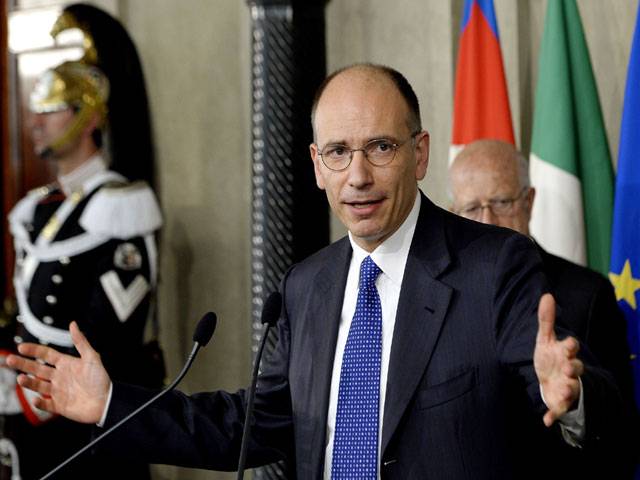ROME: Italian leftist Enrico Letta was nominated to be the new prime minister on Wednesday, bringing to an end a bitter two-month deadlock on forming a new government with the imminent launch of a coalition between right, centre and left.
Letta saidItalywas “suffering” from the economic crisis and promised to tackle job losses, company closures, growing poverty and the lack of opportunity for young people, who are forced to leave the country.
“This is an enormous and unacceptable emergency,” the 46-year-old told reporters at the presidential palace inRomeafter receiving a formal nomination from President Giorgio Napolitano.
Letta, a Europhile, also said that as premier he would “strongly commit to a change of course for European policies too focused on austerity, which is no longer enough”.
The nominee is expected to begin a series of meetings with political parties on Thursday to form his coalition government, which is expected to be installed by the end of the week.
Letta has been a minister three times and is seen as a “post-ideological” moderate able to bring together the bickering parties that had held up a government deal and bring politics closer to many ordinary Italians who are angry at their leaders.
Letta, who became Italy’s youngest ever minister in 1998, even set himself apart by arriving for the nomination meeting at the wheel of his own car — a rarity in Italy where politicians are usually chauffeur-driven.
“We need to regain credibility. We need a different kind of Italian politics,” he said after his nomination, promising to cut the number of lawmakers in parliament and reform a controversial electoral law blamed for much of the current mess.
Adding to Letta’s cross-party credentials is the fact that his uncle, Gianni Letta, has been Silvio Berlusconi’s right-hand man for many years.
Napolitano said it was now time for politicians to set aside their “polemics” and show more respect.
“The only possibility is a major convergence of political forces that can give the government a majority in both chambers,” said the 87-year-old, who was re-elected on Saturday after political leaders pleaded to him to help end their row.
“The road is open for a government that the country urgently needs,” he said.
The eurozone’s third largest economy has been mired in a political crisis ever since a general election in which a centre-left coalition led by the Democratic Party came first but failed to win an overall parliamentary majority.
The gridlock has spooked European capitals and investors had warned that prolonged uncertainty could lead to instability on the financial markets for a recession-ravaged economy that is struggling to keep its public finances in check.
The Democratic Party (PD), which had for weeks ruled out an alliance with Berlusconi’s rightist People of Freedom party, said on Tuesday it was open to any option suggested by the president.
Berlusconi has already said his party will support the president’s choice, as has the centrist Civic Choice group led by Prime Minister Mario Monti.
The combination of right, centre and left mirrors the loose alliance that backed Monti’s reform-oriented technocratic government until Berlusconi pulled his party’s support for it in December, precipitating early elections.
The PD has been badly divided since the inconclusive result of the February 24-25 polls and its entire leadership resigned on Friday after two of its presidential nominations failed to get voted because of a rebellion within party ranks.
The Five Star Movement, a new protest party that won a quarter of the vote and came third in the elections, said after talks with Napolitano on Tuesday that it would lead the opposition.
Several smaller parties on both right and left also said they would stay out of the new cabinet.
Monti’s government remains in office until a new one is formed but it has only interim powers.
Business leaders, trade unionists and the Catholic Church have urged politicians to act quickly as a painful recession forces firms to shut down and leaves many Italians struggling to make ends meet.
Stocks have been performing well in recent days as the long political crisis has drawn to an end but stocks in Milan responded negatively to Letta’s nomination, with the benchmark index down by 0.49 percent in afternoon trading.






